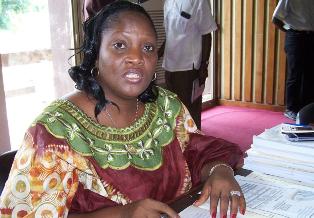Human trafficking is modern slavery

United States Ambassador to Liberia Christine Elder underscores here the need to bring issue of human trafficking to the public discourse, noting that it is one that affects Liberia’s children today, a situation that should be reversed.
Amb. Elder raised the issue recently when she addressed students of the African Methodist Episcopal University Graduate School in Monrovia on “Human Trafficking in Liberia.”
She notes that the most common form of trafficking in Liberia does not involve foreign traffickers or movement to another country but kids who end up forced to work.
“We all know what this form of trafficking looks like because we see it in Liberia every day. We all know that there are adults who take children with the intent of working them on the streets, without sending them to school, and without providing them even the most basic care. Recently, an American diplomat joined two social workers as they did a routine assessment of child labor near ELWA junction. They simply walked along the street and spoke with kids selling food, t-shirts, and water. In two hours, they spoke with 15 kids. Of those, 13 had been transported to Monrovia by an “auntie” or “uncle” who had no blood relationship with the child, and who had promised the child an education. None of them were going to school”, she recalls.
The U.S. Envoy further explains that while it is common and acceptable in Liberia for extended networks of family and friends to take care of children from more rural areas, it should not be common or acceptable for adults to exploit children for their own gain, without any concerns for their welfare or future.
We can’t agree with the Ambassador any better. This practice is prevalent in Liberia where people go in the interior and take children sometimes as young as 10 and 12 years, and bring them to Monrovia, putting parents of those unsuspecting little ones under the influence that their kids are coming to town to enroll in school, but this is far from reality.
Those children would never see road to a school building. They are either confined in homes and subjected to endless chores or sent in the streets to sell cold water, bread, plastic bags, among others to feed the home. In other words, they become breadwinners for their so-called guardians.
But Ambassador Elder points put that fighting trafficking begins with addressing some of its root causes, saying, “It requires helping people find a way to security in terms of food and shelter
She points to a clear distinction between willingly working to support oneself and even one’s family, and working because someone has made false promises and uses a child or even an adult without the power to leave the situation.
While there are laws on the book such as the 2005 Act to Ban Trafficking in Persons within the Republic of Liberia, constant public awareness and prompt enforcement still remain a serious challenge for the country.
[bsa_pro_ad_space id=1]




















